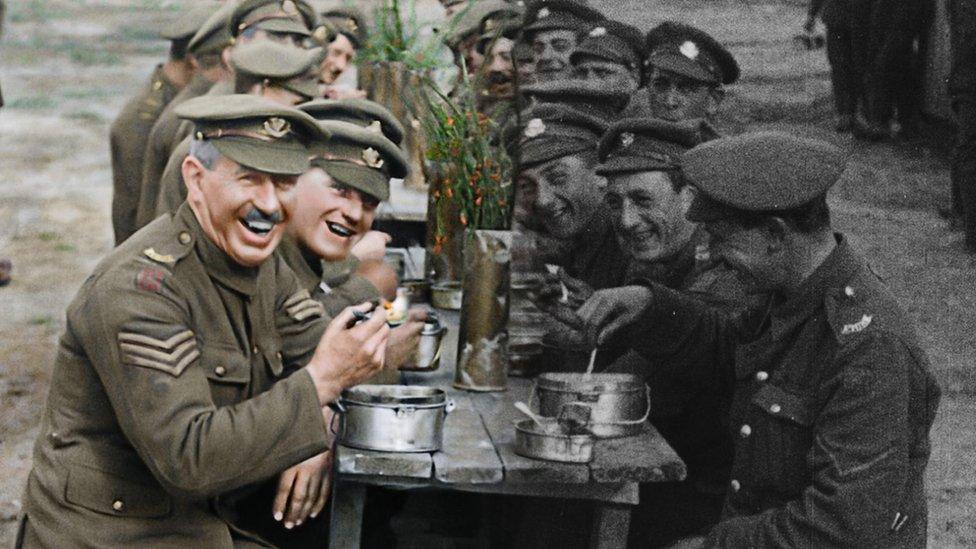They Shall Not Grow Old 'brought the war to life for us'
- Published
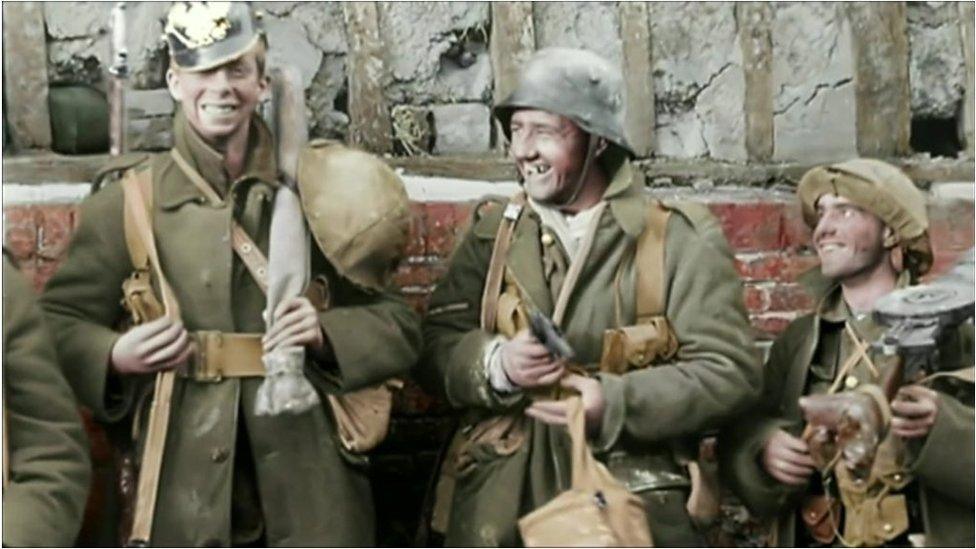
They Shall Not Grow Old is available on BBC iPlayer until Sunday
Teacher Tom Rogers had a surprise for his Year 12 students when they sat down in class this week - instead of normal lessons, he showed them Peter Jackson's ground-breaking programme on World War One, They Shall Not Grow Old.
It uses technology to transform black and white archive footage of soldiers into a visceral, full-colour documentary - and is probably the nearest thing we'll get to travelling back in time.
The reaction from the students was immediate, Mr Rogers says.
"They were in awe when the colour kicked in and the screen expanded. You should have seen the look on their faces. I had to say to them, 'This is not acting, that's real people.'
"They had studied World War One in Year 9 so they had the context to the conflict but this was real life, the war brought to life through the voices, the faces, the camaraderie, even details like the latrines."
Mr Rogers, who's English, teaches history at an international school in northern Spain. The reaction of his students was as varied as their nationalities.
Blanco Gros Pereira, who's Spanish, expressed surprise that young men were "willing to lie about their age to get in - kids of 14. They weren't scared of getting killed - they said they knew there was a job to do and accepted the risks."
Chinese national Ana Cassidy Bermudez, said she was shocked to see soldiers "laughing one minute together and then to see them dead the next. It was devastating and really brought home to me like nothing else the brutality of WWI."
American Gaby Holt admitted to being confused at the programme's end when soldiers "said they felt out of a job and didn't want to go home. I expected them to be desperate to go home but they were upset as if they'd been fired from a job.
"My understanding of the war was that everyone would have been overjoyed to go home at the end."
Allow X content?
This article contains content provided by X. We ask for your permission before anything is loaded, as they may be using cookies and other technologies. You may want to read X’s cookie policy, external and privacy policy, external before accepting. To view this content choose ‘accept and continue’.
Each frame of the film was hand-coloured and the footage 3D-digitised to allow the viewer to see and hear the troops as we imagine they really were.
Jackson used forensic lip-readers to find out what the soldiers were saying and then had actors voice their words.
The programme was watched by 2.1 million people on the evening of Remembrance Sunday - and audiences have until Sunday 18 to catch it on BBC iPlayer.
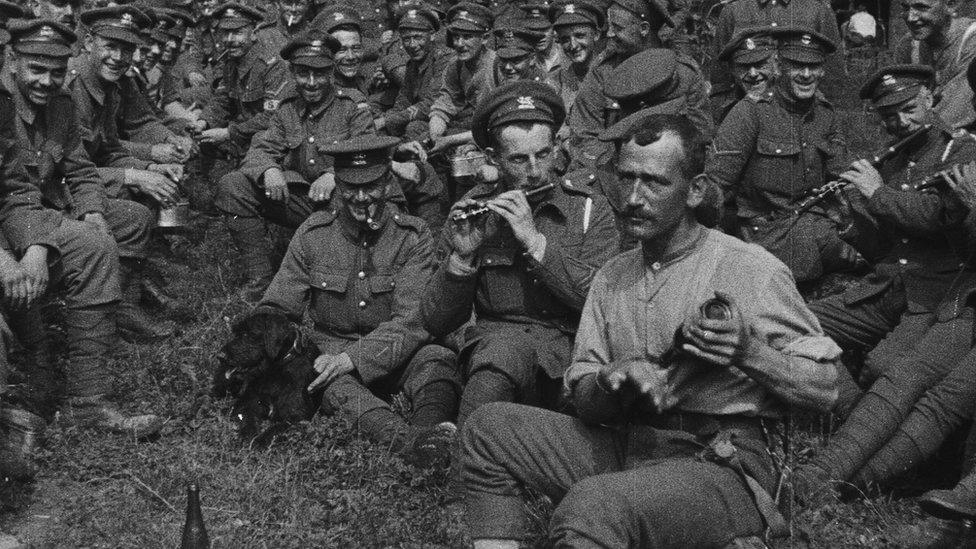
A frame of the original footage of a conflict which Peter Jackson says wasn't "a black & white war"
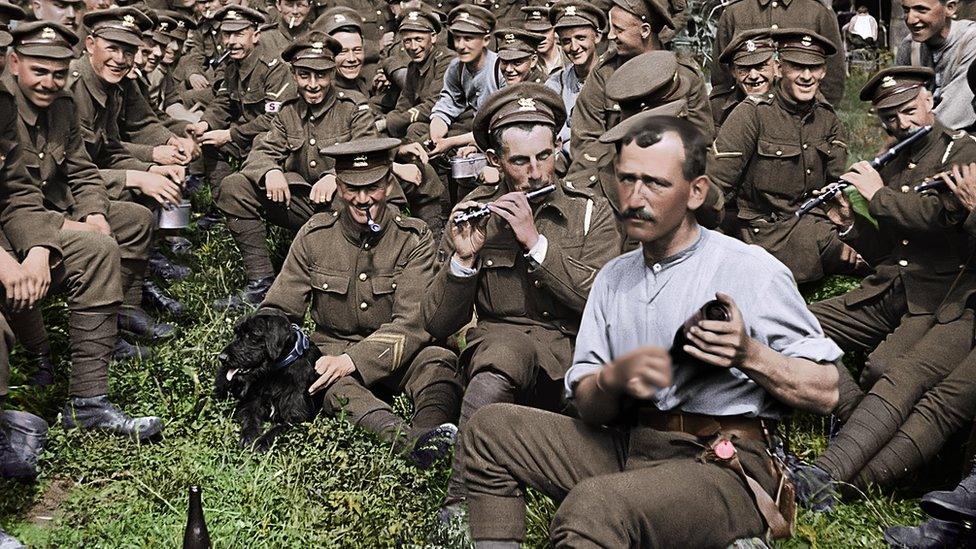
The same scene is dramatically transformed through the use of colour and sound
Actor and children's author David Walliams, external described it as "one of the greatest documentaries I have ever seen", adding that it brings "the horror and futility of WWI to life in a way I have never seen before".
Others on Twitter were also keen to add their praise:
Allow X content?
This article contains content provided by X. We ask for your permission before anything is loaded, as they may be using cookies and other technologies. You may want to read X’s cookie policy, external and privacy policy, external before accepting. To view this content choose ‘accept and continue’.
Allow X content?
This article contains content provided by X. We ask for your permission before anything is loaded, as they may be using cookies and other technologies. You may want to read X’s cookie policy, external and privacy policy, external before accepting. To view this content choose ‘accept and continue’.
Another viewer, Chris Roe-Bullion, from Essex, says he believes it should be shown "as it is" to secondary school students with some editing needed for those at primary schools.
A Scout leader with family who served in both world wars, he says he learned a lot.
"I had some idea about the conditions but I had no idea just how awful they were. The image that sticks in my mind is of a hand in the mud - it looks like someone reaching for help as they were sucked down. It brought an absolute lump to my throat.
"That thought of people falling to the ground and disappearing beneath the mud. You almost hope that someone took a rifle to spare them.
"I also did not realise how divided the Germans were amongst themselves - Saxons hating the Prussians and so forth."
Silent film footage from World War One was painstakingly restored by Lord of the Rings director Peter Jackson
Chris stayed up long after the programme finished on BBC2, mulling it over and thinking of how many soldiers signed up "really believing that they were going on a 'great big adventure'".
"We had about 200 people turning out for our local Remembrance Sunday event - Scouts, British Legion and others. Having watched this programme, I know that we can never forget."
Another viewer, Sue Rhodes, external, thinks British society can become desensitised to conflicts the further away they are in time and the film is an antidote to that.
"I only planned to watch 10 or 15 minutes and see what people's reactions were but I ended up watching it all. That moment when the programme went from silent to sound and colour - it literally took my breath away. So moving.
"When you see black and white, it is almost as if they are not real people but this really brought home the realities to you - the bodies, the death scenes, the injuries."
Ryan O'Sullivan, external, a British-based Australian of Irish origin, agrees it's important for young people in particular to watch the programme and draw lessons from it.
"Teenagers and people in their twenties - they should thank their lucky stars. No conscription, comparatively peaceful lives, they don't have to live through all of that.
"One of the key points I came away with was how the British forces befriended many of the German prisoners of war - they realised that they were just like them. They didn't want to be part of the fighting at all."
- Published10 November 2018
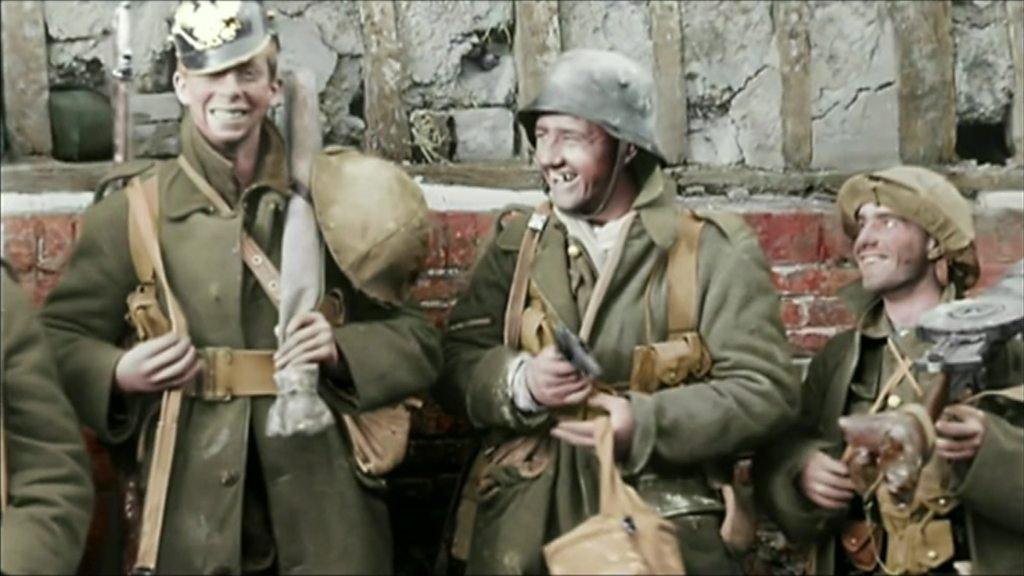
- Published20 October 2018
- Published9 October 2018
